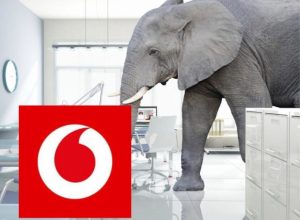
Vodafone Group shares in Vodafone Ghana is now for sale. This is good time to do some analysis of why the industry giant is not doing well in Ghana. This article could have been headlined “Lessons for whoever buys Vodafone Ghana”. The entity that eventually buys Vodafone Ghana needs to read this.
Vodafone is no doubt one of the biggest telecom brands in the world today. In several markets, it is either the market leader or at least in the top and most profitable three. Even in Africa, its subsidiaries like Safaricom Kenya and Vodacom South are some of the very high-performing operators.
So, when Vodafone chose to come to Ghana in 2008, it was like a vote of confidence in the Ghanaian economy.
We felt privileged, and they did so in style – what their then Head of Corporate Communications, Major Albert Don-Chebe described as “painting Ghana red with a red party.” But it would appear that after the party, Vodafone has gone from this giant that made other players nervous about what it was going to bring onboard, into a mere shadow of what the company truly is around the world.
Very often, writeups like this is expected to bring out some very complex and technical reasons why such a big brand would slide into near oblivion in one market while thriving in other markets.
But lets forget about the technicalities and complexities and focus on the very obvious things that have made Vodafone what it is in Ghana today, in spite of their big brand name and value.
For one, in Ghana, Vodafone has on several occasions been adjudged as the Best Brand and or Best Telecoms Brand.
Indeed, its leaders and products have almost always won very prestigious awards year after year since their entrance into Ghana. So, one wonders why for so many years the company has remained unprofitable and has failed to live up to its billing in Ghana.

The Group paid an initial US$900 million for 70% of the Ghana operations, and has since invested several millions of dollars into the network, but none of that seem to deliver the golden eggs.
These reasons I am about to assign to why Vodafone is struggling in Ghana are largely in the public domain and also based on my own personal experiences and interactions with the company as an industry journalist and a keen watcher over the years. Others may have different or other opinions on what the causes are.
Let’s jump straight into it:
ELITIST Tendencies
I honestly think Vodafone is elitist. For starters, when Ghana went GSM in the early 1990s, Ghana Telecom’s OneTouch (mobile wing), which was later inherited by Vodafone, was the most expensive on the market in terms of SIM card prices.
While Spacefon (now MTN) sold SIM cards at 600,000 cedis (GHS60) at the time, OneTouch sold it at double the price, 1.2 million cedis (GHS120).
They openly boasted about being a premium (elitist) network and only a certain class of people could afford to be on that network. Indeed, their customers also relished the moment and rubbed it in the face of customers of other networks.
For some of us, it was not out of place for Vodafone to have agreed to purchase Ghana Telecom (OneTouch) at the time because the way OneTouch had positioned itself as an elitist network was in sync with Vodafone’s own aspirations and how it has positioned itself in other markets.
In the UK, for instance, where Vodafone is headquartered, it was and probably still is the most expensive network it terms of call and SMS tariffs. So it is in several other markets like Australia, Germany, South Africa (Vodacom) and several other markets.
Not long ago, the South Africa Police initiated a process to transfer a contract from Vodacom to MTN and the reason was cost. Vodafone is too expensive. period.
RUBBISHING low-end customers
So, when Vodafone entered Ghana, they maintained that posture and it reflected in a number of other ways. For instance, years back Vodafone decided to increase fix broadband prices across board and a greater majority of their customers protested vehemently.
In addressing customer concerns, the then CEO, Kyle Whitehill, who was obviously well cultured to maintain the elitist posture of the brand, described the complaints of the masses as “rubbish”, then stated that the few high-end (elite) customers from whom Vodafone made a bigger chunk of its data revenue were not complaining but those complaining were people from whom Vodafone was not even making any significant money.
At the time of the complaints about fixed broadband prices, the masses pointed out that Vodafone hardly attended to customer complaints about service quality and yet they were quick to increase prices. Meanwhile, at that time, the high-end (elite) customers got all the attention in terms of customer service and so they had nothing to complain about.
MNP Strategy
Again, when Mobile Number Portability (MNP) was introduced in Ghana, same man, Kyle Whitehill made the point that everywhere there had been MNP, there was evidence to show that the high-end (elite) customers constituted the majority of people who ported their numbers, so his MNP strategy was targeted at those few high-end customers on other networks because they bring in the money.

Clearly, this was a man trained to focus on the elite, satisfy them and cash in on their satisfaction, while the masses are left to hang dry. And while Kyle was talking tough, the then Head of Communications at Vodafone, my good friend Carmen Bruce-Annan, actually endorsed his tough talk by saying that Kyle was fearless, candid and aggressive and he did not mind the media publishing he tough talk. But when it backfired, she came back trying to manage it. Afterthought!
BRANDING Masters
One top telecom executive who crossed over from Vodafone to MTN recently told me something that confirmed a notion I have always held that Vodafone are masters of extreme branding, and they are very deliberate with it, even when they don’t have what it takes to deliver on a branding claim.
He said that when he crossed over from Vodafone to MTN he realised that MTN staff used to get very nervous whenever Vodafone launches a branding campaign because they realized that, in form, the Vodafone campaigns were usually very compelling. But then he quickly understood why MTN was succeeding and Vodafone was not.
The simple explanation was that MTN is extreme on investment based on research-based insights, while Vodafone is extreme on branding without the investment to deliver on the claim.
There are several examples of this. Let’s take a few.
4G
When the whole 4G LTE conversation started in Ghana, prior to MTN acquiring its 4G license at US$67.5 million, the then Vodafone Ghana CEO, Yolanda Cuba, who now works for the MTN Group, became one of the dominant voices in the conversation around 4G.
Her argument in-chief was that Ghana was not ready for 4G because there were not enough 4G compatible devices in Ghana to make the investment worth their while. She then made the argument that Vodafone’s 3G, backed by a solid network will deliver better service quality and customer experience than any 4G network at the time.

When her claim backfired, their then Head of Communications tried to explain away her comments but it failed because she even repeated same comments in other forums.
Fast forward, when MTN acquired their 4G license, Yolanda Cuba and her team hurriedly organized a forum, and they laid out a whole lecture on internet of things (IoT) and how their network was provisioned to deliver IoT. At the time, the National Communications Authority’s Quality of Service Reports were reflecting some challenges on the Vodafone network.
But it was all branding and propaganda. It was as if to say, “MTN may have a 4G license, but we are the champions of IoT”. It was mere talk, but no real network to deliver on it. Some NCA officials I spoke to at the time laughed it off and said Vodafone’s claim was not worth their comment. Till today, they have not been able to deliver on that talk.
At some point, Vodafone even tried to enter the 4G market cheaply via the back door through a proposed partnership with Surfline, but that backfired until recently.
So, while MTN was investing against an expected future for 4G uptake, Vodafone was talking down the whole idea and making it look like losing out on a 4G license was no big deal. Today, MTN is the overwhelming market leader in the 4G space because they invested, even though they did not engage in any empty branding.
4.5G Claim
It even gets better. Years later when Vodafone acquired their 4G license, which was just half of what MTN acquired directly from NCA, not to talk of the additional spectrum MTN bought from Goldkey, Vodafone was quick to start putting themselves out as having a 4.5G network, to make it look like they had something which was more superior to what MTN had. But some industry experts laughed Vodafone’s claim off citing two main reasons:
- The size of Vodafone’s 4G spectrum was nowhere near what MTN had so it was even funny that Vodafone would seek to create the impression of superiority.
- The technology Vodafone claim to have deployed to push their 4G network to 4.5G or 4G+, was something that MTN had long rolled out but did not even bother to call it 4.5G. What was important for MTN was the experience they delivered to customers, while Vodafone was focused on the branding as usual.
Mobile Money BLUEPRINT
Just like Vodafone Ghana did with 4G, they cheated themselves out of the mobile money revolution, while priding themselves with having the blueprint and yet doing nothing practically to stake their claim.
In the same interview where former Vodafone Ghana CEO Kyle Whitehill said he was going after MTN customers with his MNP strategy, he also stated that MTN’s approach to mobile money was not ideal because it did not drive the cashless society agenda, and that, Vodafone had the mobile money blueprint and they will change the game once they enter the market.
Kyle was right, Vodafone indeed held the blueprint for mobile money because it was an invention of Safaricom Kenya, which is a Vodafone company. But being right is not always the same as being smart or strategic. At the time, Ghanaians were not used to the ideal way mobile money (M-Pesa) worked in Kenya.
What MTN found out, via research was that Ghanaians were used to over-the-counter services, where they gave money to merchants to send on their behalf instead of loading their own wallets for transfers. That process came with a lot of risks such as customers’ PIN being known to merchants and all of its consequence. But MTN invested in it for six years, barring the risks, and they lost a lot of money in the process.
MTN, however, used that period to win the confidence of Ghanaians as the preferred mobile money platform. So, when the time came for regulation to push for the ideal situation, MTN was already the overwhelming mobile money service provider Ghanaians knew, and Vodafone’s so-called blueprint had completely lost its value, in terms of pushing Vodafone as a major player in that space. In fact, Airtel and Tigo even launched mobile money before Vodafone did. So, what was the point in branding yourself the blueprint holder and yet sitting by for other to dominate the market before you even enter?
Poaching from Airtel Money
When Vodafone finally realized their gaffe, I thought they were going to conjure some mobile money demigods from space to roll out their almighty blueprint, but they quickly poached some of the top minds in the industry from Airtel Money, Martison Obeng-Agyei and Carl Ashie. But again, Vodafone failed to invest for those experts to deliver the value they wanted. So, eventually the two have jumped ship.
Now Vodafone has resorted to free transfers to all networks and that innovation has won a number of awards and pushed Vodafone to a weak number two on the mobile money market. But it is not bringing in value for shareholders. Meanwhile, MTN remains the overwhelming market leader in that space, while Vodafone still remains a mere shadow of its true self, even as the mobile money blueprint holder.
By Samuel Dowuona
Source: www.techgh24.com









